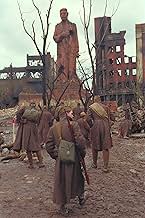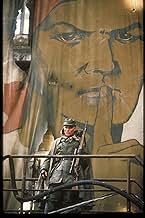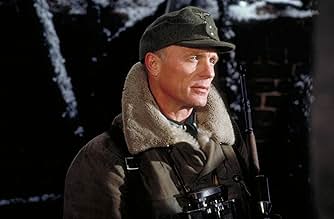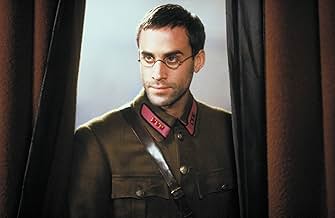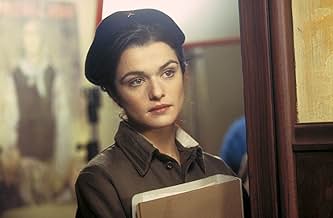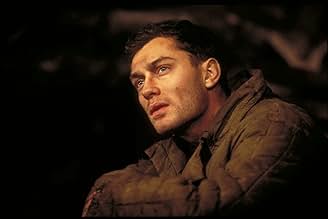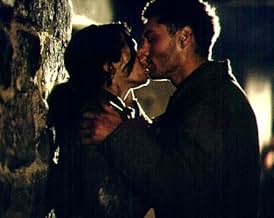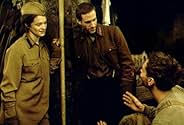Un francotirador ruso y otro alemán juegan al gato y al ratón durante la batalla de Stalingrado.Un francotirador ruso y otro alemán juegan al gato y al ratón durante la batalla de Stalingrado.Un francotirador ruso y otro alemán juegan al gato y al ratón durante la batalla de Stalingrado.
- Dirección
- Guión
- Reparto principal
- Premios
- 7 nominaciones en total
Gabriel Thomson
- Sacha Filipov
- (as Gabriel Marshall-Thomson)
Hans-Martin Stier
- Red Army General
- (as Hans Martin Stier)
Clemens Schick
- German NCO
- (as Clemans Schick)
Reseñas destacadas
Not a bad war film - but only if you know nothing about the actual battle. The film makers are entitled to take artistic license, and although some historical characters are present in the film, it never even comes close to portraying the battle as it was. Much of the fighting lacks reality and the computer generated Stuka dive bombers attacking reinforcements crossing the Volga are totally unrealistic.
The film takes a quick peek at several themes of the actual battle but explores none - including the character of Zaitsev himself, whose role in the battle was quite different from Law's character. It is worth mentioning that several other Russian snipers, in Stalingrad and elsewhere, killed many more Germans than Zaitsev. It is also amazing how many people believe that Konig is based on a real character called Hartmann, A good tale, but untrue. Still, its a decent film, but the real Stalingard epic has yet to be made
The film takes a quick peek at several themes of the actual battle but explores none - including the character of Zaitsev himself, whose role in the battle was quite different from Law's character. It is worth mentioning that several other Russian snipers, in Stalingrad and elsewhere, killed many more Germans than Zaitsev. It is also amazing how many people believe that Konig is based on a real character called Hartmann, A good tale, but untrue. Still, its a decent film, but the real Stalingard epic has yet to be made
If you go into this film hoping for an historically accurate portrayal of the battle of Stalingrad then go watch a documentary, if you are however looking to be entertained by an action packed and gritty WW2 movie set in the city of Stalingrad, then go ahead and pick this up because it's nothing if not entertaining.
The movie is about the real life sniper Vasily Zaitsev played by Jude Law and his exploits during the famous battle, the beginning of the movie is complete chaos as our main hero is sent to the front and we see the besieged and infamous city for the first time. It's honestly worth watching this movie just for the opening scene alone which is just incredibly well done in all aspects and portrays some of the horrors that the soviet troops would have witnessed when arriving there.
Overall this is a highly entertaining war movie, fantastic CGI for the time, everything is well shot, the set pieces are gorgeous and even the acting and characters are well done.
All that said this is of course a Hollywood production, don't expect much in the way of historical accuracy and definitely expect a silly love story (though not the worst) and everyone speaking English with poor Russian and German accents.
The movie is about the real life sniper Vasily Zaitsev played by Jude Law and his exploits during the famous battle, the beginning of the movie is complete chaos as our main hero is sent to the front and we see the besieged and infamous city for the first time. It's honestly worth watching this movie just for the opening scene alone which is just incredibly well done in all aspects and portrays some of the horrors that the soviet troops would have witnessed when arriving there.
Overall this is a highly entertaining war movie, fantastic CGI for the time, everything is well shot, the set pieces are gorgeous and even the acting and characters are well done.
All that said this is of course a Hollywood production, don't expect much in the way of historical accuracy and definitely expect a silly love story (though not the worst) and everyone speaking English with poor Russian and German accents.
No doubt the title is an indication of what the film would LIKE to be about. The Germans forces were indeed "at the gates" - they are on the verge of capturing Stalingrad, they would lay siege to Leningrad, and at one point even Moscow appeared to be in danger. The situation was desperate. But after we're told all this, the position of the German army turns out to have no more to do with the story than the position of the sun in the zodiac. After a bitter, violent battle over - well, we're never told - nothing of a military nature happens again. Not even offstage. (Until the end, when, after a brief "offensive" of unfathomable significance, an epilogue tells us that the Germans were repelled from after all.) All the action in Stalingrad freezes so that we can watch a protracted duel between a Russian and a German sniper.
Now I'm prepared to believe that snipers played a valuable role in this kind of warfare - I wouldn't know - but Vassili's primary value, we must assume in the absence of information to the contrary, is as propaganda - a means of keeping up the morale of the local troops. But there's something circular here. The snipers are the only people we see doing any actual fighting, and by the end of the film they seem to be devoting all their efforts to shooting a German sniper who is in turn doing nothing but trying to shoot Vassili. What does ANY of this have to do with, you know, the invasion?
The fact that the troops of a hostile foreign power are on Russian soil (they haven't yet been defeated, and it looks to be only a matter of time before even Moscow would be overrun) doesn't seem to motivate the characters to do much. Nobody makes a single decision for the good of the war effort as a whole. Danilov builds up the Vassili legend because of personal feelings and is ready to tear it down later for other personal reasons; Tania wants to kill Germans - kill them herself, by hand, rather than help her fellow soldiers as best she can by working in intelligence - because they killed her parents; Danilov tries to transfer her to a safer job not because that's where she should be (it's a mere coincidence that that IS where she should be), but because he's hitting on to her; Vassili's heart isn't in the duel with the German sniper until he has a casual acquaintance's death to avenge. When Sacha's mother is told that her son is a traitor (now serving the forces who have bombed the city she grew up in to rubble), her only reaction is, "Perhaps he'll be safer with them than with us." Wherever we look, we see dreary personal concerns. Did any of these people notice that the enemy IS at the gates?
If Anaud was trying to make his characters more plausible by making them pettier, he failed. When Sacha tells a third party what we supposedly already know - that Tania is in love with Vassili - it came as news to me. I hadn't seen any insipient love anywhere. I suppose I ought to have worked it out, by assuming that the single female character must be there to fall in love with someone and using a process of elimination to work out who it was (she plainly didn't care for one of the two candidates, therefore she must be head over heels with the other one), but really, even in a movie as dull as this, I have better things to do.
Now I'm prepared to believe that snipers played a valuable role in this kind of warfare - I wouldn't know - but Vassili's primary value, we must assume in the absence of information to the contrary, is as propaganda - a means of keeping up the morale of the local troops. But there's something circular here. The snipers are the only people we see doing any actual fighting, and by the end of the film they seem to be devoting all their efforts to shooting a German sniper who is in turn doing nothing but trying to shoot Vassili. What does ANY of this have to do with, you know, the invasion?
The fact that the troops of a hostile foreign power are on Russian soil (they haven't yet been defeated, and it looks to be only a matter of time before even Moscow would be overrun) doesn't seem to motivate the characters to do much. Nobody makes a single decision for the good of the war effort as a whole. Danilov builds up the Vassili legend because of personal feelings and is ready to tear it down later for other personal reasons; Tania wants to kill Germans - kill them herself, by hand, rather than help her fellow soldiers as best she can by working in intelligence - because they killed her parents; Danilov tries to transfer her to a safer job not because that's where she should be (it's a mere coincidence that that IS where she should be), but because he's hitting on to her; Vassili's heart isn't in the duel with the German sniper until he has a casual acquaintance's death to avenge. When Sacha's mother is told that her son is a traitor (now serving the forces who have bombed the city she grew up in to rubble), her only reaction is, "Perhaps he'll be safer with them than with us." Wherever we look, we see dreary personal concerns. Did any of these people notice that the enemy IS at the gates?
If Anaud was trying to make his characters more plausible by making them pettier, he failed. When Sacha tells a third party what we supposedly already know - that Tania is in love with Vassili - it came as news to me. I hadn't seen any insipient love anywhere. I suppose I ought to have worked it out, by assuming that the single female character must be there to fall in love with someone and using a process of elimination to work out who it was (she plainly didn't care for one of the two candidates, therefore she must be head over heels with the other one), but really, even in a movie as dull as this, I have better things to do.
I went to see "Enemy at the Gates" with my husband, as I knew it was about his favorite battle of his favorite war that he watched continually on the Military Channel. After having to endure a harangue the whole way to the screen about how we would be seeing the real battle that won the war, not that inconsequential D-Day that "Saving Private Ryan" made such a big deal about as the U.S. didn't come in until the Russians already had turned the tide, I asked could he please be quiet during the movie and refrain from commenting on inaccuracies, etc. until after.
But other than the clarification I needed between the Battle of Leningrad and the Siege of Stalingrad which I always mix up (whoops, I think I just did it again), and Hitler's and Stalin's fallacies as military leaders in relation to the symbolic importance of the Volga (and the movie could have used more strategic explanations), he and I pretty much agreed about the movie.
There's a taut, gritty war movie screaming to come out of a drekky melodrama. The best parts are the battles, of troops and individuals. The opening sequence of soldiers thrown from trains to boats to the front line is terrific and frightening.
The one-on-one between Ed Harris's Nazi sharpshooter and Jude Law's hunter (though he doesn't do working class too convincingly) is exciting.
The most captivating surprising is Bob Hoskins as Krushchev. He completely inhabits the character and brings him completely to blood and guts life - showing just what it takes to survive as a top man to Stalin.
There was also more potential in Joseph Fiennes' political officer as insight into propaganda that is only occasionally effective (after all, "Ryan" was similarly about a PR stunt).
I thankfully dozed off during most of the ridiculous sub-plot of the love triangle. There appears to be only a couple of women living in this city, and they sure do get in the way, as these few can themselves provide multi-lingual translations, sex, food, lousy child care and brave sharpshooting.
The music by James Horner is atrociously bombastic, wincibly so.
(originally written 3/31/2001)
But other than the clarification I needed between the Battle of Leningrad and the Siege of Stalingrad which I always mix up (whoops, I think I just did it again), and Hitler's and Stalin's fallacies as military leaders in relation to the symbolic importance of the Volga (and the movie could have used more strategic explanations), he and I pretty much agreed about the movie.
There's a taut, gritty war movie screaming to come out of a drekky melodrama. The best parts are the battles, of troops and individuals. The opening sequence of soldiers thrown from trains to boats to the front line is terrific and frightening.
The one-on-one between Ed Harris's Nazi sharpshooter and Jude Law's hunter (though he doesn't do working class too convincingly) is exciting.
The most captivating surprising is Bob Hoskins as Krushchev. He completely inhabits the character and brings him completely to blood and guts life - showing just what it takes to survive as a top man to Stalin.
There was also more potential in Joseph Fiennes' political officer as insight into propaganda that is only occasionally effective (after all, "Ryan" was similarly about a PR stunt).
I thankfully dozed off during most of the ridiculous sub-plot of the love triangle. There appears to be only a couple of women living in this city, and they sure do get in the way, as these few can themselves provide multi-lingual translations, sex, food, lousy child care and brave sharpshooting.
The music by James Horner is atrociously bombastic, wincibly so.
(originally written 3/31/2001)
In the grand tradition of Old Hollywood, this international co-production seeks to frame the key battle of WW2 (the REAL key battle, not the ones from the John Wayne movies) as a morality tale involving a love triangle.
It is a bold idea, and beautifully executed.
In fact an argument could be made -- and I will make it -- that any flaws in the execution (it lags a bit here and there) are the result of the film-makers' "reach exceeding their grasp" and they attempted too much, more than one film could ever accomplish.
But what a film it is! You viewer feel as though you are there, making history. The four stars involved have, each of them, never given a bad performance in their careers and they surely maintain their records here.
Ed Harris in particular -- although he has less screen time -- will always to this reviewer seem a vastly under-rated actor. (This review written in 2017 where an older Harris still uses his charisma in a defining role for HBOs Westworld .... and nails it.) Recommended? Absolutely! In the Metacritic data that IMDb so helpfully provides I could not help but notice one reviewer commenting that, well, it sure isn't in the same class as SAVING PRIVATE RYAN.
Which is the irony of doing film reviews. I have never not once thought of wanting to see SAVING PRIVATE RYAN again, but this film is one I like to revisit every few years. Magnificent.
It is a bold idea, and beautifully executed.
In fact an argument could be made -- and I will make it -- that any flaws in the execution (it lags a bit here and there) are the result of the film-makers' "reach exceeding their grasp" and they attempted too much, more than one film could ever accomplish.
But what a film it is! You viewer feel as though you are there, making history. The four stars involved have, each of them, never given a bad performance in their careers and they surely maintain their records here.
Ed Harris in particular -- although he has less screen time -- will always to this reviewer seem a vastly under-rated actor. (This review written in 2017 where an older Harris still uses his charisma in a defining role for HBOs Westworld .... and nails it.) Recommended? Absolutely! In the Metacritic data that IMDb so helpfully provides I could not help but notice one reviewer commenting that, well, it sure isn't in the same class as SAVING PRIVATE RYAN.
Which is the irony of doing film reviews. I have never not once thought of wanting to see SAVING PRIVATE RYAN again, but this film is one I like to revisit every few years. Magnificent.
¿Sabías que...?
- PifiasIn the scene where Vassili is lighting the cigarette butt he picked up from the German sniper, it's apparent by the flame he uses a butane lighter. Butane lighters were not invented until the 1950's.
- Citas
Commisar Danilov: I've been such a fool, Vassili. Man will always be a man. There is no new man. We tried so hard to create a society that was equal, where there'd be nothing to envy your neighbour. But there's always something to envy. A smile, a friendship, something you don't have and want to appropriate. In this world, even a Soviet one, there will always be rich and poor. Rich in gifts, poor in gifts. Rich in love, poor in love.
- Créditos adicionalesThe end credits are slanted and curved.
- Banda sonoraLa Chanson des Artilleurs
Music by Tikhon Khrennikov
Lyrics by Viktor Gusev
(C) Musikvertag Hans Sikorski, Hamburg
Performed by The Red Army Choir (as Les Choers De L'Armee Rouge)
Courtesy of 7 Productions, Paris
Selecciones populares
Inicia sesión para calificar y añadir a tu lista para recibir recomendaciones personalizadas
- How long is Enemy at the Gates?Con tecnología de Alexa
Detalles
- Fecha de lanzamiento
- Países de origen
- Sitios oficiales
- Idiomas
- Títulos en diferentes países
- Enemic a les portes
- Localizaciones del rodaje
- Empresas productoras
- Ver más compañías en los créditos en IMDbPro
Taquilla
- Presupuesto
- 68.000.000 US$ (estimación)
- Recaudación en Estados Unidos y Canadá
- 51.401.758 US$
- Fin de semana de estreno en EE. UU. y Canadá
- 13.810.266 US$
- 18 mar 2001
- Recaudación en todo el mundo
- 96.976.270 US$
- Duración2 horas 11 minutos
- Color
- Mezcla de sonido
- Relación de aspecto
- 2.35 : 1
Contribuir a esta página
Sugerir un cambio o añadir el contenido que falta


